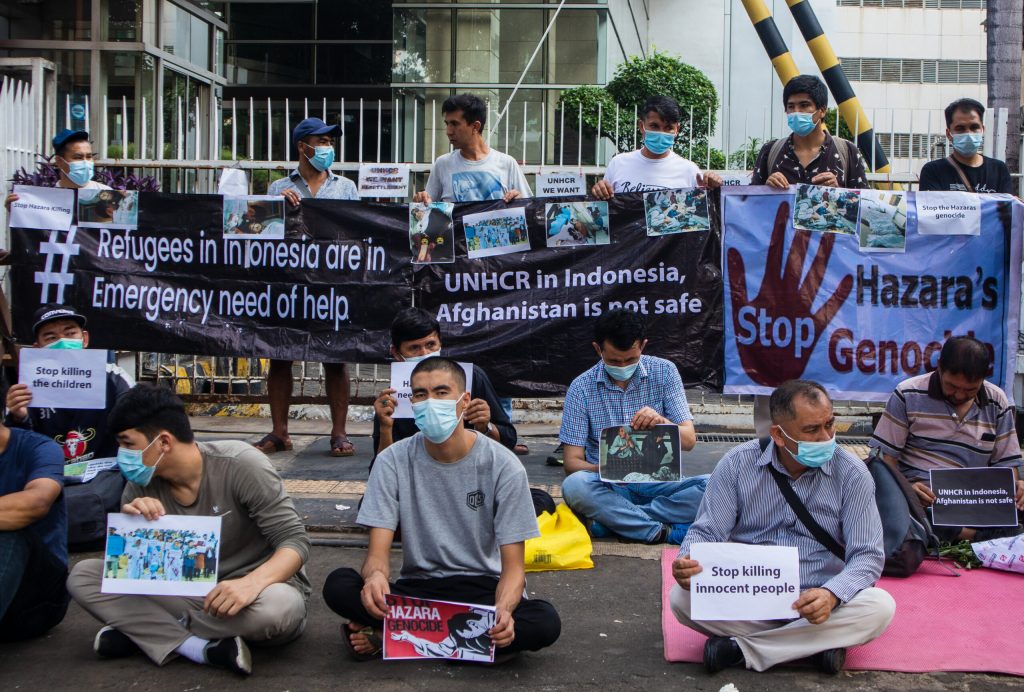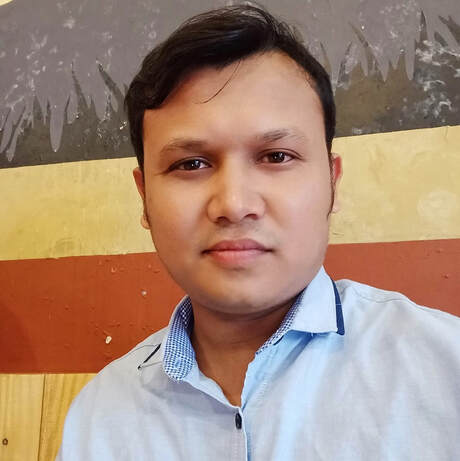
Seeking Refuge, Fighting for Freedom: Refugee Mental Health, an Invisible Public Health Crisis

*All authors contributed equally to this publication (Ryan Sutherland, MPH, and JN Joniad)
Bio: JN Joniad is a Rohingya journalist and the journalism editor of the Archipelago, an online magazine that is a home for new literature and art that explores migration, identity and decolonization. He is a student of political science and human rights activism. He was formerly an engineering and physics student in Myanmar before being forced to flee to Indonesia. Joniad contributes to film and publishing accounts of refugees searching for a safe and durable solution to migration. For examples of Joniad’s recent publications, please review A Life in Lockdown (Peril magazine), and his recent article “The challenges we face in a non-signatory country” published in Oxford University’s Forced Migration Review (page 65-66).
The number of global refugees has reached an all-time high. The World Health Organization estimates that 258 million people are international migrants and 763 million people are internal migrants. Over 65 million people among these groups have been forcibly displaced from their homes due to conflict such as genocide and war, or due to severe climate disasters. 86% of all migration occurs within developing countries, presenting a serious public health crisis and straining under resourced health systems.
Migrants often suffer from PTSD and other stress-related psychological disorders stemming from traumatic experiences (war, rape, etc.) during or before migration, oftentimes unaddressed as a result of a lack of access to comprehensive and culturally-informed mental health counseling. The denial of basic rights, the uncertainty of resettlement to third countries, strict deterrence policies, and the global COVID-19 pandemic have further exacerbated pre-existing mental-health conditions.
Frequently, refugee communities report facing heightened discrimination in asylum countries, often prohibited from seeking employment or further education, denied the right to marry, and stripped of basic human rights. Even after the resettlement process, challenges such as the loss of culture, community, and language as well as the need to adapt to a new and foreign environment can contribute to negative mental health outcomes.
Indonesia: A Case Study
“My own county has become a foreign country, my own people have become foreigners to me, and I have become a wanderer of the universe.” – JN Joniad, Wanderers of the World
Indonesia hosts 14000 refugees across the country, but is a non-signatory to the 1951 Refugee Convention and its protocols and has continued to deny refugees their basic rights. Most refugees are placed in IOM accommodations where they face severe restrictions. Refugees in Makassar have been protesting community detention, describing it as an open prison.
In IOM accommodation, a strict curfew is enforced after 10 pm and refugees are restricted in their ability to socialize, prevented from inviting friends to stay over. They cannot leave Makassar without permission or legally attend political rallies. Refugees receive a small monthly allowance, well below the minimum wage. Unable to apply for a driver’s license, detainees are forced to use their meager monthly stipend to pay for public transportation. Refugees live a life of uncertainty: they are still in danger of being sent back to detention if they disobey the restrictions imposed on them by the authorities.
Refugee mental health is frequently undiagnosed, inadequately treated, and stigmatized
Most refugees suffer from mental disorders such as insomnia, depression, anxiety and stress, frequently undiagnosed, inadequately treated, and stigmatized. If left unaddressed, these symptoms can worsen, manifesting as more severe life-shortening disorders or leaving them more susceptible to negative health outcomes. Although respiratory infections, malaria and intestinal worms, measles, diarrheal diseases and malnutrition are among the top diseases diagnosed among refugee communities, few studies have investigated the spread and long-term effects of poor refugee mental health. Because refugees do not receive timely or adequate medications, denied access to national health care services, their conditions worsen over the years. Although IOM provides basic medications and healthcare, since Australia has reduced funding for refugees to IOM in 2018, support to asylum seekers in Indonesia is now limited to emergencies.
One of the major contributing factors to refugees’ poor mental health is the lack of activities they are permitted to pursue—they are denied their right to work and study, unable to rebuild their lives. Additionally, their uncertainty status and future exacerbates pre-existing mental-health conditions. Traumatized by war and conflict in their home countries, witnessing the genocide of their family members and loved ones, starved or tortured on their perilous journeys in search of safety, refugees have largely been left to grapple with the psychological scars alone as ardly any psychological resources are made available to them.
Mental isolation
“There is only one psychologist for all the refugees in Makassar. [Refugees] are very anxious about their future,” said Sulasmi Sidiman, a psychologist at Bosowa University, Makassar. Sidiman said refugees are stressed because they face cultural and language barriers, receive no local social support and are “mentally isolated.”
“This [isolation] makes them depressed because they cannot adjust to the environment. They don’t have any daily activities to keep their brain functioning. They don’t feel like they are at home here as they are not accepted by their neighbors; they are being called illegal immigrants. Under such circumstances, they can suffer from mental disorders. In worse case scenarios, this can lead to suicide and schizophrenia and affect their physical health as well.”
A number of refugees have already faced tragic deaths. An increasing number have resorted to suicide. Since the start of the pandemic, six refugees have taken their lives in Makassar alone. The pandemic has significantly affected available resources and social activities for refugees which were already sparse before the COVID-19 crisis, especially for those who are not under IOM’s watch. Since independent refugees receive no assistance, unable to access shelters and receive a financial allowance, many have been left to fend for themselves in Jakarta and are at highest risk.
Australia and Operation Sovereign Border: discriminatory detainment policies
Since 2013, refugees across Indonesia have protested the cruel treatment from immigration officers in their fight for resettlement to a third country. Most refugees came to Indonesia with the desire to resettle in Australia, but in 2013, Australia implemented Operation Sovereign Border. Through this policy, Prime Minister Rudd announced that refugees who had arrived by boat after July 2013 would never be resettled in Australia, a policy which has put in place Australia’s restrictive offshore detention plan. This worsened refugees’ mental health, limiting their possibilities to resettle. Indonesia was heavily incentivised to work together with Australia’s harsh measures to bar the “illegal maritime arrival” into Australia. The intent of Australia’s cruel treatment of refugees is to deter possible future arrivals, but has ultimately stranded thousands of refugees in Indonesia indefinitely.
Since then, resettlement prospects for refugees have greatly been reduced over the years and some have been trapped in an indefinite limbo for nearly a decade. This year, amid the pandemic, refugees continued their protests even in Jakarta, the city hardest hit by the pandemic in Indonesia.
“We are not afraid to die because we have already lost our future. We are sick physically and mentally. It does not matter whether corona kills us today or not, I am sure we will die suffering in this limbo,” one refugee noted when asked if they were afraid to contract COVID-19 as Jakarta’s cases continue to climb.
An Invisible Crisis
Migrant health should be culturally competent and informed by human rights, but often falls short. Often, as a result of complex barriers to care seeking (language, concerns for cost, lack of culturally competent care, etc.), refugees do not seek timely mental health care or face barriers to care in asylum or resettlement countries. Furthermore, as a result of societal stigma, mental health is frequently deprioritized in marginalized communities, putting refugees at higher risk of mental health crises and suicide.
What can be done?
According to the World Health Organization, eight key actions should be taken to support improved refugee and migrant mental health, particularly aimed at policy makers:
– “Promoting mental health through social integration;
– Clarifying and sharing information on entitlements to care;
– Mapping outreach services (or setting up new services if required);
– Making interpreting services and/or cultural mediation services available;
– Working towards integration of mental, physical and social care;
– Ensuring that the mental health workforce is trained to work with migrants;
– Investing in long-term follow-up research and service evaluations for service
planning and provision; and
– Sharing principles of good practices across countries.”
Overall, refugee mental health is an invisible public health crisis that has remained largely unaddressed and undiscussed.

BCPHR.org was designed by ComputerAlly.com.
Visit BCPHR‘s publisher, the Boston Congress of Public Health (BCPH).
Email [email protected] for more information.
Click below to make a tax-deductible donation supporting the educational initiatives of the Boston Congress of Public Health, publisher of BCPHR.![]()
© 2025-2026 Boston Congress of Public Health (BCPHR): An Academic, Peer-Reviewed Journal
All Boston Congress of Public Health (BCPH) branding and content, including logos, program and award names, and materials, are the property of BCPH and trademarked as such. BCPHR articles are published under Open Access license CC BY. All BCPHR branding falls under BCPH.
Use of BCPH content requires explicit, written permission.